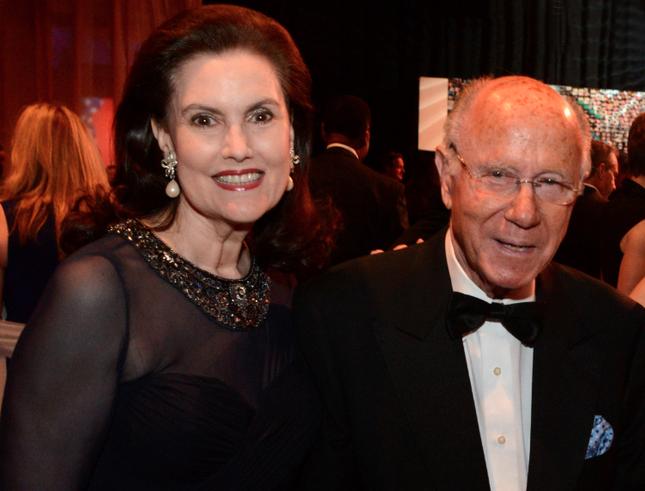Arnaud de Borchgrave, Legendary Newsman, Dies at 88
By • March 5, 2015 0 3800

Legendary Washington newsman Arnaud de Borchgrave, former editor-in-chief of the Washington Times and top foreign correspondent for Newsweek for 30 years, died Feb. 15 at the age of 88 of cancer.
Known around town and the world for his access to international leaders as well as for a stylish, high-profile manner, de Borchgrave was one of the last of the great, on-the-scene, hands-on journalists who were actually where he said he was. He personified and lived the life of the foreign correspondent at Newsweek magazine and later put his charismatic and journalistic stamp on a young Washington Times.
He was born in Belgium on Oct. 26, 1926. During World War II, his father, Count Baudouin de Borchgrave d’Altena, was director of military intelligence for the exiled Belgium government. His mother, Audrey Townshend, was the daughter of a British general. De Borchgrave escaped the Nazi invasion of southern France only to return with Canadian forces at Juno Beach during D-Day in 1944.
In 1949, de Borchgrave worked for the United Press news agency and succeeded Walter Cronkite — later the managing editor and lead anchor for CBS News — as its Belgium bureau chief. By 1951, de Borchgrave was head of the Paris bureau for Newsweek in Paris and later hired his successor, Ben Bradlee, who would go to become executive editor of the Washington Post.
The list of places and persons de Borchgrave reported on is a long one and included leaders of Egypt, Israel, Jordan, Libya, Syria and wars in Vietnam, Afghanistan and the Middle East.
Known for his foreign reporting, de Borchgrave was also known for the advantage of his sartorial style, his expense accounts and his seemingly perpetual tan.
A few quotes by de Borchgrave in a Newsweek feature in 2012 tell the tale:
— “I saw this in Morocco once. I had a Chesterfield coat with a black velvet collar. Looked like a diplomat. Nasser was coming in his yacht to Casablanca and getting together with all these Arab heads of state, and the media was dressed, as you know, how the media dresses. I was dressed like an ambassador. And I managed to get in with the ambassadors. I did that over and over again.”
— “Reporting always came first. For example, Newsweek had me on the lecture tour after each major scoop. They would bring me back to talk to the advertisers. But I remember once having a deal with Juan Carlos of Spain. I said, ‘Newsweek is about to put me on a big lecture tour of the states. What if something happens to Franco and you become king?’ So we organized a little code. The message that he would send me was, ‘Charlie is on his way to Rome and wants to see you.’ That meant Franco is sick and dying. I was in Seattle when I got it. I canceled the rest of the tour. The Newsweek business team was furious. They’d invested a lot of money. But I said, ‘I’m sorry, I’m going to get the biggest scoop—the first interview with the new king of Spain.’ Which I did.”
— “I lived extremely well. I traveled a lot. In those days we always traveled first-class. Was never questioned. We stayed in five-star hotels. Never questioned. If we had to stay in one place for several days or weeks, we could get a suite. Never questioned. I never had an expense account questioned in the whole 30 years I worked at Newsweek.”
In 1985, de Borchgrave, who had never worked at a newspaper, became the editor-in-chief of the then three-year-old Washington Times and quickly put it on the map, going up against the city’s biggest paper, the Washington Post, which at the time owned Newsweek.
Owned by the Unification Church and its founder, the Rev. Sun Myung Moon, the Washington Times was a conservative voice in the nation’s capital during the Reagan years. Nevertheless, de Borchgrave denied that Moon or the church directly influenced editorial policy at the newspaper. De Borchgrave left the Times in 1991.
“Arnaud was an extraordinary man,” Wesley Pruden, told the Washington Times, where Pruden succeeded de Borchgrave as editor-in-chief until his retirement in 2008. “He came to us when we were struggling against considerable hostility to establish a second newspaper in Washington, and overnight he gave the Times identity, purpose and credibility. His friends teased Arnaud that he was ‘a legend in his own mind,’ but we were all in awe of his enormous self-confidence and his intrepid and relentless pursuit of the story. He leaves us a true legend in his own times.”
Indeed, the headline of a specially printed fake edition of the Washington Times in 1996 did read, “A legend in his own mind,” accompanied by a front page photo of de Borchgrave wearing military fatigues. It is for a 70th birthday party for de Borchgrave at the Washington Times headquarters on New York Avenue. The party was attended by Bradlee, who knew de Borchgrave from his Newsweek years — it is the only time that Bradlee is known to have come to the Times offices.
In 1998, De Borchgrave went on to work for United Press International and stayed on as a columnist until his death. He was also director of the Transnational Threats Project at the Center for Strategic and International Studies.
De Borchgrave’s survivors include his wife of 45 years, Alexandra Villard De Borchgrave; a daughter by his second wife (Eileen Ritschel), Trisha de Borchgrave; a sister; a two granddaughters. A son by his first wife (Dorothy Solon), Arnaud de Borchgrave, Jr., died in 2011.

